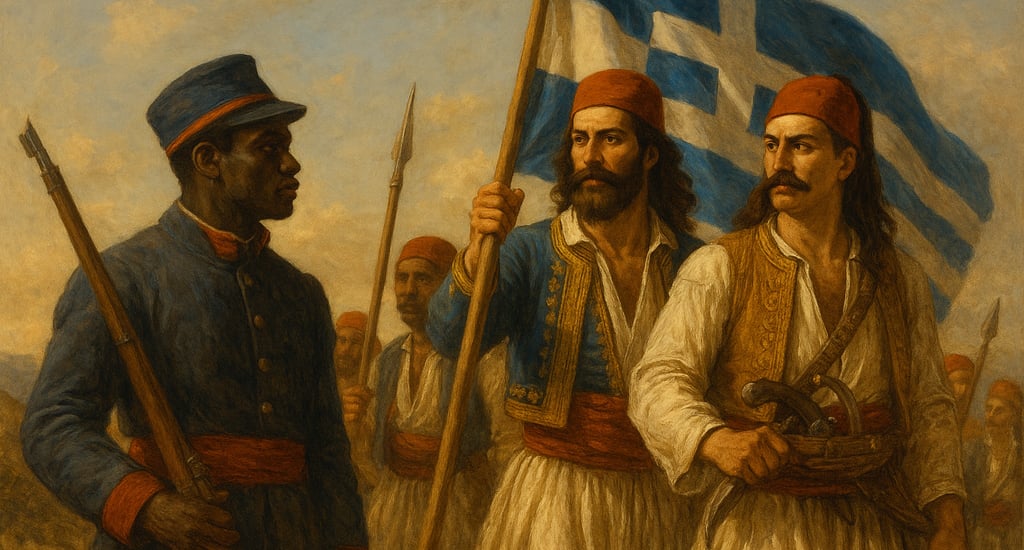How Haiti Became the First Nation to Recognize Greece’s Independence
In 1821, while Europe hesitated, Haiti stood with Greece in its war of independence. Discover how the first free Black republic supported the Greek struggle for freedom.
ENGLISH THROUGH HISTORY
Adi English
4 min read


🌍 Story 2: Haiti & Greece (1821)
LEVEL 3 – Advanced
Length: ~574 words
In 1821, the Greek people rose in rebellion against the Ottoman Empire, beginning a long and bloody war that would eventually establish their independence. For nearly four centuries, Greece had lived under Ottoman rule, with heavy taxes, restrictions on religion, and little political power. By the early nineteenth century, nationalist ideas had spread across Europe, and the Greeks were inspired to fight for a state of their own.
The war was brutal. Greek fighters were poorly equipped, often carrying outdated weapons or farming tools. They faced the vast armies of the Ottoman Empire, which struck back with harsh reprisals. Entire villages were destroyed, massacres occurred, and famine followed. Despite these hardships, the rebellion gained support from ordinary peasants, exiled leaders, and religious figures who saw freedom as worth any sacrifice.
Europe watched the conflict with fascination. Many intellectuals and artists sympathized with the Greeks. The British poet Lord Byron not only raised money but personally traveled to fight in the war, where he died of illness in 1824. Philhellenism — the love of Greek culture and the idea of supporting Greek independence — spread widely. But most European governments were cautious. The Ottoman Empire was still a powerful force, and rulers feared that helping the Greeks would upset the delicate balance of power in Europe.
Yet, across the Atlantic, recognition came from a very different place. Haiti, a small Caribbean nation, became the first state to officially support Greek independence. Haiti had only recently secured its own freedom from colonial rule after one of the most remarkable revolutions in history. In 1804, enslaved people in Saint-Domingue, led by figures such as Toussaint Louverture and Jean-Jacques Dessalines, defeated Napoleon’s armies and declared independence as the Republic of Haiti. It was the first Black republic and the first nation born from a successful slave revolt.
Haiti’s President, Jean-Pierre Boyer, understood better than most the price of liberty. His young nation was already struggling with economic isolation, trade blockades, and crushing reparations demanded by France. Still, he saw in Greece’s struggle a reflection of Haiti’s own. In 1822, Boyer sent a letter to the Greek revolutionaries expressing admiration for their bravery and declaring Haiti’s recognition of their independence. This was not just diplomatic language — it was a moral and symbolic statement that freedom belonged to all people.
Boyer even promised to send 25 Haitian volunteers to fight alongside the Greeks. Due to Haiti’s poverty and the difficulty of crossing the Atlantic, the soldiers never arrived. But the act of recognition itself carried immense weight. At a time when European governments hesitated, it was Haiti — the world’s youngest and most embattled republic — that declared solidarity with Greece.
For the Greeks, this message showed that their struggle was part of a larger human story. Haiti, a nation of formerly enslaved people, recognized in Greece’s fight the same desire for liberty and dignity. The connection between two small nations on opposite sides of the world demonstrated that the dream of freedom did not belong to any one race or continent. It was universal.
Today, this episode is remembered as a remarkable gesture of solidarity. It shows that support does not always come from the powerful. Sometimes, it comes from those who have themselves endured oppression and therefore understand it most deeply. The story of Haiti and Greece reminds us that courage travels across oceans and that the bonds of freedom often connect the most unlikely of allies.
Vocabulary (10 words)
1. Rebellion – an armed fight against a government or ruler.
Explanation: Used when people rise up against authority.
Example: The rebellion spread quickly across the countryside.
Student example: _____________________
2. Massacre – the violent killing of many people.
Explanation: Usually refers to war crimes or extreme violence.
Example: The village suffered a brutal massacre during the war.
Student example: _____________________
3. Balance of power – when countries keep equal strength to avoid war.
Explanation: A common idea in international politics.
Example: Britain feared Russia would upset the balance of power.
Student example: _____________________
4. Colonial rule – control of a land by a foreign empire.
Explanation: Often connected to exploitation and lack of rights.
Example: India was under British colonial rule for centuries.
Student example: _____________________
5. Enslaved – forced to live and work as a slave.
Explanation: Used to describe people taken and owned by others.
Example: Millions of Africans were enslaved during the Atlantic slave trade.
Student example: _____________________
6. Isolation – being separated or cut off from others.
Explanation: Can be geographic, political, or social.
Example: The island lived in isolation for centuries.
Student example: _____________________
7. Symbolic – representing something bigger than itself.
Explanation: Often refers to gestures with deeper meaning.
Example: The handshake was symbolic of peace.
Student example: _____________________
8. Liberty – freedom to live and act without control.
Explanation: A formal word for independence and rights.
Example: The revolution was fought for liberty and justice.
Student example: _____________________
9. Gesture – an action that shows meaning or intention.
Explanation: Can be small but powerful in its message.
Example: Sending flowers was a kind gesture.
Student example: _____________________
10. Solidarity – unity and support among people.
Explanation: Often used in political and social struggles.
Example: Nations showed solidarity after the earthquake.
Student example: _____________________
Exercises (Level 3)
Comprehension:
What started in Greece in 1821?
Why were European governments hesitant to support Greece?
How did Haiti gain its independence?
What promise did Boyer make to the Greeks?
Why was Haiti’s recognition symbolically important?
Multiple Choice:
Who was Haiti’s president in 1821?
a) Toussaint Louverture b) Jean-Pierre Boyer
c) Dessalines d) Pétion
In what year did Haiti become independent?
a) 1776 b) 1804 c) 1821 d) 1848
How many Haitian volunteers were promised?
a) 15 b) 25 c) 50 d) 100
Why did the soldiers never arrive?
a) France stopped them b) Haiti was too poor and isolated
c) The Greeks refused them d) The Ottomans blocked them
What did Haiti’s gesture symbolize?
a) Military strength b) Colonial power
c) Solidarity of oppressed peoples d) European influence
Fill in the Blank:
The Greek _______ began in 1821.
European powers feared upsetting the _______ of power.
The Haitian people had once been _______.
Haiti’s support was highly _______.
The nations shared a dream of _______.
True/False:
Haiti was the second country to recognize Greece.
Haiti promised soldiers but they never came.
Haiti’s recognition carried symbolic meaning.
European powers immediately helped Greece.
Haiti’s own people had been enslaved.
Discussion:
Why do you think Haiti recognized Greece when stronger nations did not?
How are the struggles of Greece and Haiti similar?
Do small countries play important roles in world history?
Why can symbolic acts sometimes matter more than material help?
Can you think of another modern example where one country showed solidarity with another?
